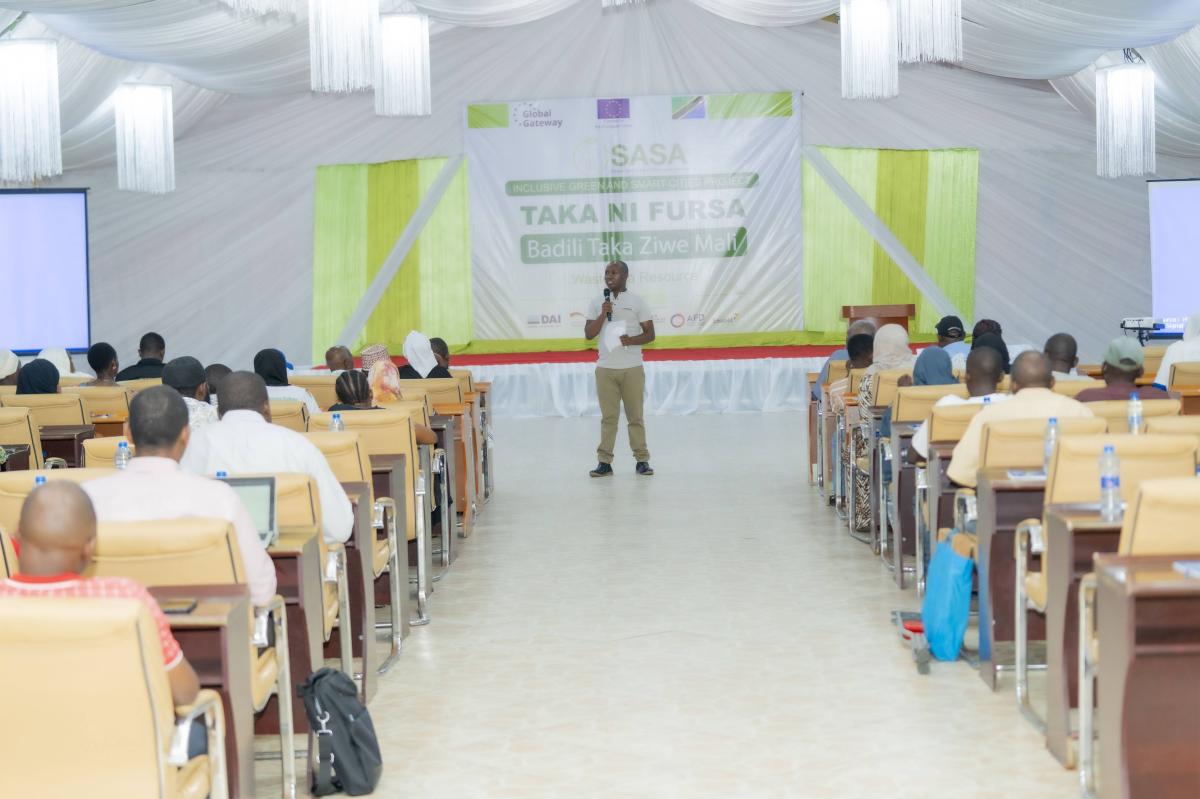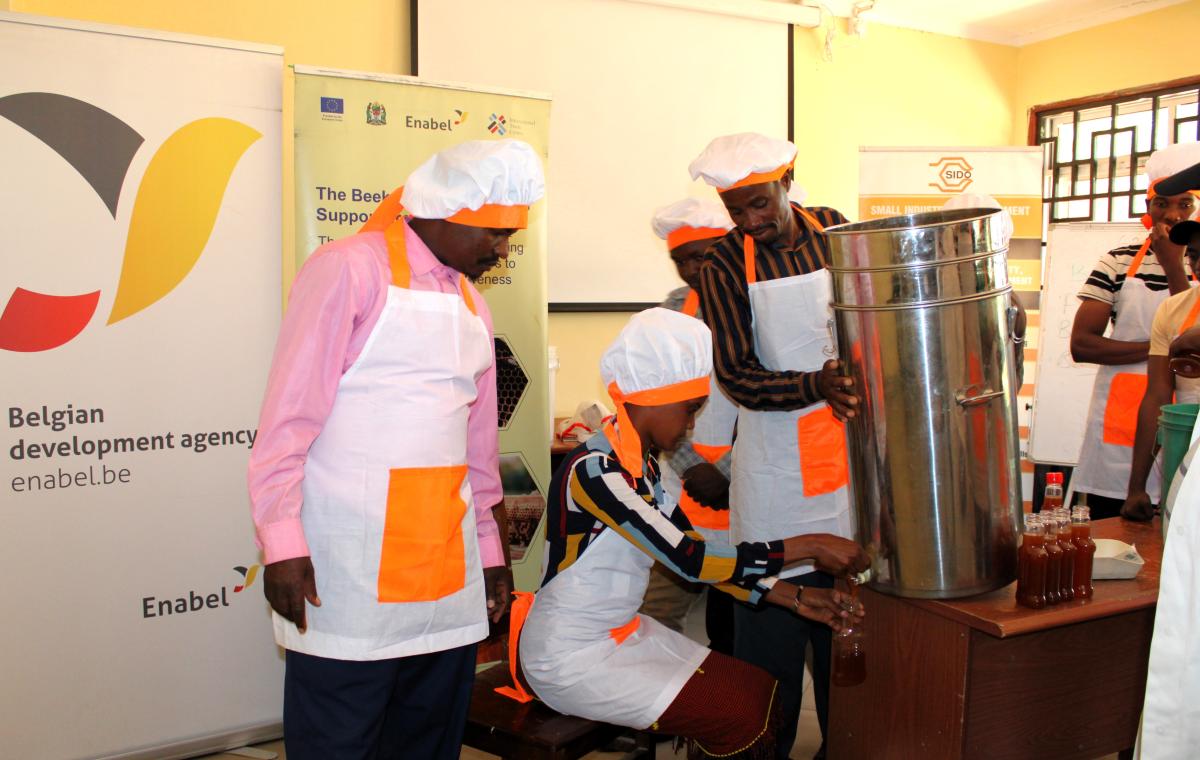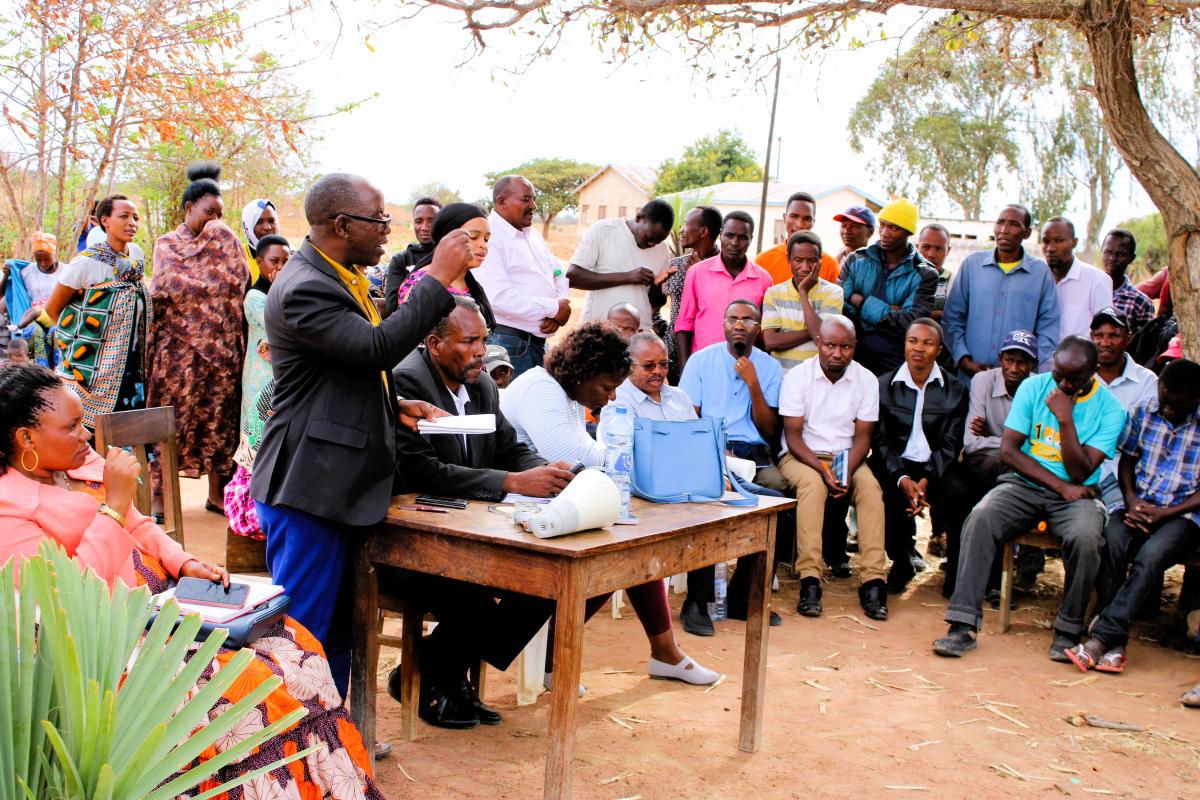Search
Viewing 1 to 15 of 62 news
-
Circular economy entrepreneurs provoked to set up bankable businesses
Mkama MWIJARUBI | 22/11/2024
Three hundred entrepreneurs in Mwanza and Tanga, participated in a two-day session geared to stimulate learning, exchange and developing viable business models in management of waste. Bringing together their varied backgrounds and experiences in waste management, the participants were excited to learn and exchange knowledge about solid waste business opportunities ranging from crafting decorations, making furniture and animal feed. Enabel supported the learning as an implementer of the EU funded Inclusive, Green and Smart Cities Program (SASA). Under SASA program, Enabel leads INCLU-CITIES project that focuses on sustainable urban development to create resilient, inclusive and environmentally friendly cities that can thrive in the face of future challenges. Developing viable businesses in the circular economy is at the centre of Enabel’s activities under INCLU-CITIES in three urban areas— Mwanza, and Tanga on Tanzania Mainland and Pemba in Zanzibar. The training rooms vibrated with ideas and insights, as trainers probed entrepreneurs to approach waste not only as a resource for petty income but commercial viable businesses. In Tanga, an exhibition of products from waste recycling and reusing preceded indoor sessions while in Mwanza, a street clean up session followed indoor sessions. Tanga produces 230 tons of solid waste every day. The City council collects 60% of these and private waste management entrepreneur’s process up to 40%, “With the collaboration with INCLU-CITIES, we need to increase the capacity of private entrepreneurs to process a higher percentage of the current and future waste as viable businesses,” said Kizito Mkwabi, Tanga City Environment and Sanitation Officer. Enabel support will catalyse circular economy entrepreneurs to up their game through acquisition of technology, capital, networks and markets for products and services. To achieve this multi-pronged objective Enabel collaborates with multiple partners: municipal authorities in Mwanza and Tanga and implementing partners—Rikolto, TRIAS, Westerwelle, Financial Sector Deepening Trust, Vocational Education Training Authority (VETA) and Small Industries Development Organization (SIDO). Ends
-
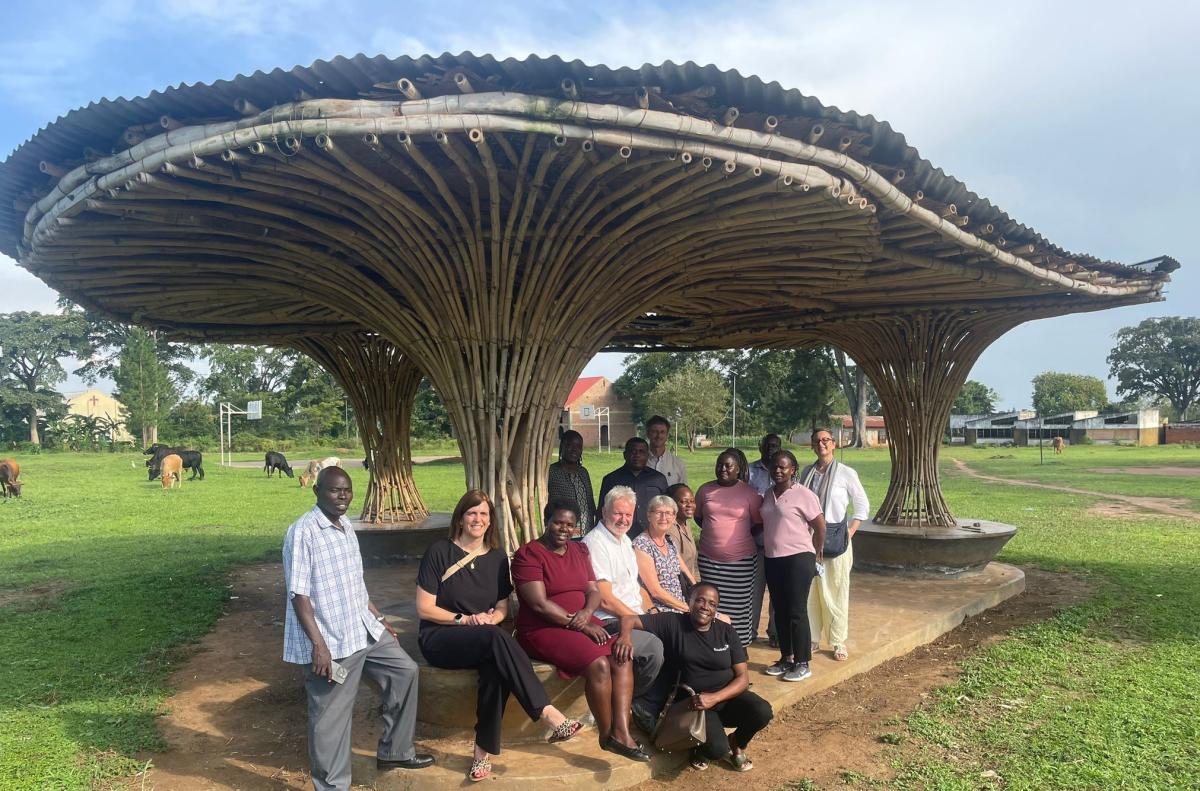
Enabel teams in Uganda and Tanzania embrace action research to enhance education
Proscovia GREGORY | 29/10/2024
From September 24 to 29, Enabel’s teams from Uganda and Tanzania came together at the National Teacher Training College in Kaliro, Uganda, for a specialized training on Action Research in Education. This training, led by Prof. Geert Kelchtermans and Dr. Ann Deketelaere of the Centre for Innovation and the Development of Teacher and School (CIDTS) at KU Leuven, was a significant step in strengthening our approach to innovation in educational practices. By equipping our teams with skills to assess the impact of their initiatives, action research provides a rigorous framework to refine strategies that address regional challenges while contributing to the wider discourse on effective education interventions. As one of our trainers noted, “Action research is a mindset as much as it is a method.” This mindset is essential in educational settings where ongoing reflection and critical questioning are paramount. By continuously evaluating our assumptions and adapting our strategies based on evidence, we create dynamic, responsive approaches that maximize our impact. Action research allows for this flexibility, grounding our practices in data-driven insights while helping us identify the best pathways forward. During the training, participants outlined six key questions that will steer our upcoming action research projects and address priority areas within Enabel’s educational programs: 1. What are the determining factors for the use of mobile digital toolkits in lower secondary schools in the Kigoma region? As we work to enhance digital access and learning, identifying the factors that affect the use of mobile digital toolkits is essential. This question will enable us to analyze how digital tools can most effectively contribute to learning outcomes in lower secondary schools, particularly in the Kigoma region. By better understanding these factors, we can optimize toolkit deployment to foster digital literacy and improve student engagement. 2. Does community outreach influence parents' attitudes towards education?Community involvement plays a pivotal role in shaping attitudes toward education, especially for marginalized groups. Through action research, we aim to measure how outreach initiatives impact parents’ support for their children’s education, particularly for girls, and evaluate their role in promoting sustained school attendance. 3. What is the effect of school-led projects on student access and retention in lower secondary education?School-led projects, such as the Menstrual Hygiene Management (MHM) initiatives, are critical in addressing barriers to education. These initiatives have already shown a positive effect on girls’ attendance. Through this research, we aim to assess how various school-led efforts influence student retention and contribute to a supportive educational environment. 4. How effective is our CPD delivery in practice?Investing in teachers is central to Enabel’s education initiatives. This research question focuses on evaluating our CPD program's impact on teaching practices and classroom dynamics. By examining the program’s effectiveness, we can refine training to better equip teachers with the skills needed to create inclusive and responsive classrooms. 5. How do “friends of education” contribute to the access and retention of girls, vulnerable boys, and young mothers?Community mentors, known as “friends of education,” play an influential role in supporting girls, vulnerable boys, and young mothers. This question explores how these advocates contribute to students’ educational journeys, helping them overcome obstacles and stay engaged in school. 6. How does our menstrual hygiene management (MHM) model affect attendance and classroom engagement of adolescent girl students?Access to MHM resources has proven to be transformative in keeping adolescent girls in school. By analyzing the model’s impact on attendance and engagement, we aim to refine approaches that empower girls to continue their education confidently and comfortably. The cross-border collaboration among Enabel’s WeLearn/WeTeach (Uganda), Wezesha Binti (Tanzania), and the Digital Innovation for Education scaling project (Uganda/Tanzania/Rwanda) in partnership with KU Leuven’s CIDTS is crucial for advancing these action research initiatives over the next two years. This partnership enhances our professional capacity to make informed, data-driven decisions that improve educational access and quality in East Africa. A key aspect of this initiative is fostering South-South knowledge exchange. Participants from Uganda, Tanzania, and Rwanda will act as critical friends, supporting each other in refining research approaches, learning from peer experiences, and scaling effective practices regionally. This model of mutual accountability and shared learning strengthens our collective impact, providing a foundation for sustainable, region-specific solutions. The outcomes of this work will guide policy adaptations, support the refinement of educational practices, and contribute to creating environments where all students, especially girls, vulnerable boys, and young mothers, can thrive. Our commitment to rigorous action research and regional collaboration underscores Enabel’s dedication to building inclusive, resilient education systems across East Africa, empowering the next generation of learners to realize their full potential.
-
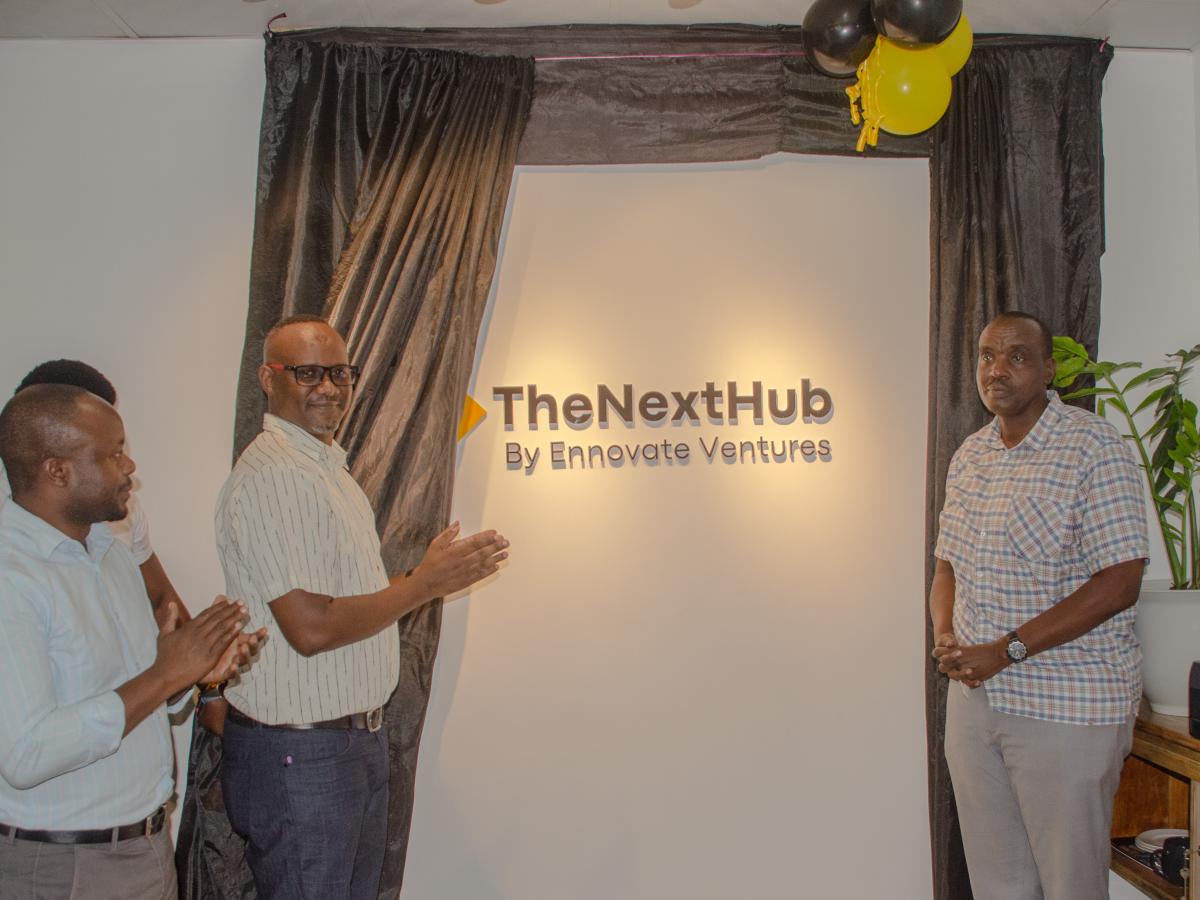
Enabel and Government collaboration to mint digital entrepreneurs in Mwanza
Mkama MWIJARUBI | 28/10/2024
Nuru Michael, in her late twenties, enjoys her participation in the first cohort of trainees at Mwanza city’s first open digital innovation hub, thanks to Enabel’s collaboration with Ennovate Ventures and the government.“I’m excited to get an opportunity to participate in a guided learning about digital business; I’ll study digital marketing. I’m eager to learn and prove that girls can do what they need with technology. My success will prove to other girls that they can be good in technology as well,” she said. With funding from the European Union, Enabel provided Ennovate Ventures, a business development company, a grant to run a two year initiative to empower youth’s as competitive entrepreneurs in the digital ecosystems. The upbeat tone reflected on the Senior Mwanza Regional economist Patrick Karangwa, who officially launched the lab on behalf of the Regional Commissioner on 15 October 2024. “We hope that this centre will help facilitating advancement of personal growth for youth and their families. Technology is critical for development. Our youth need technology skills because Tanzania must benefits from integrating in international markets,” said Patrick Karangwa. This is the first open digital innovation lab in Mwanza, giving youth access to internet, online courses that aim to make them tech savvy to take on challenges of the digital economy. Tanzania’s urban population, currently estimated at 30% of its overall population is expected to reach 50% around 2040. While the cities in Tanzania offer opportunities for job creation, innovation and inclusion the promises is tainted with low level of professionalization of business, limited access to technology, lack of financial literacy among other limitations. “Through Ennovate Ventures, Enabel supports effort to transform youth into technology savvy entrepreneurs. Youth entrepreneurs, especially girls, face challenges including capital, business ideas, and markets. One of the solutions harness mobile technology for business,” said Thomas Ekaruwa, TVET Advisor with the INCLU-CITIES project. The two year project, INCLU-CITIES is part of the European Union's bigger program, dubbed SASA , that intends to create wealth and enhance the quality of life for people – in particular women and youth – of the cities of Mwanza, Tanga and Pemba through improving conservation of the environment and creating decent jobs. It is expected that by the end of the project a particular number of youths, like Nuru, in Mwanza will have valuable skills to the labour market and many more will be capable to venture on their own as business persons.
-
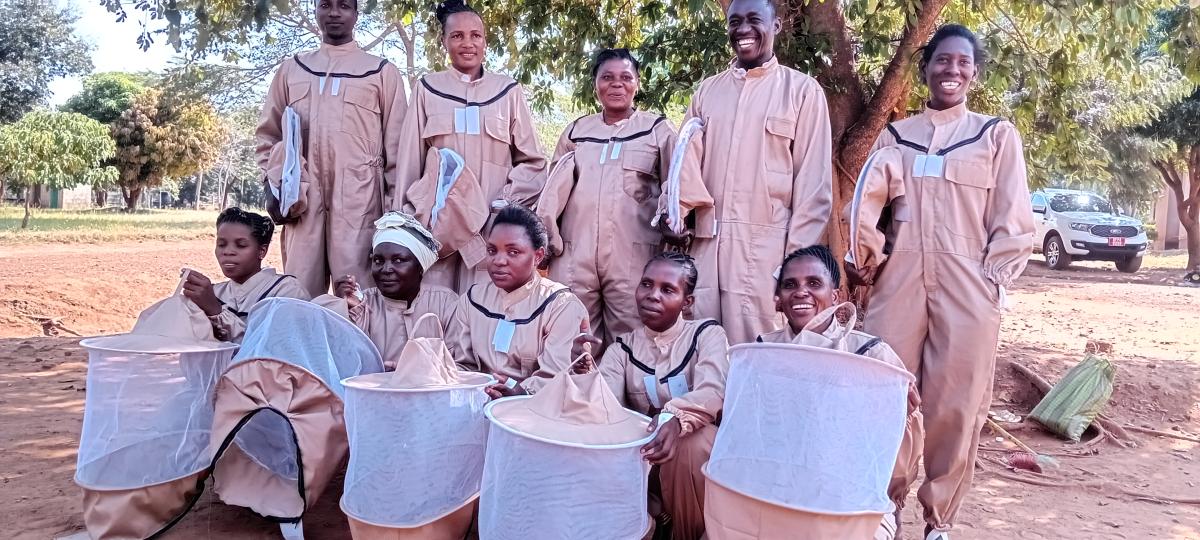
In Tanzania, Enabel and partner VETA Mpanda train local tailors in beekeeping suit production
Deogratius KIMENA | 01/06/2024
In an effort to improve access to beekeeping inputs, Enabel and Vocational Education and Training Authority (VETA) Mpanda are facilitated bee suit making training to 15 local tailors from Nsimbo, Mlele, and Tanganyika districts from May 20th to June 1st, 2024. In addition to the technical skills, the trainees benefited with entrepreneurship skills.On picture, you can see skilled tailors wearing beekeeping suits they made after during their training.
-
Empowering honey sellers in Tanzania: Ikungi-Singida vendors gain skills in hygiene, packaging, and business
Deogratius KIMENA | 01/06/2024
A roadside honey seller from Ikungi-Singida gears up with practical learning on best hygienic practices, packaging, record-keeping, and business skills.Sessions were facilitated in collaboration with Small Industries Development Organization (SIDO) Singida for roadside honey sellers from Ikungi, Itigi, and Uyui districts from May 30th to June 1st, 2024.
-
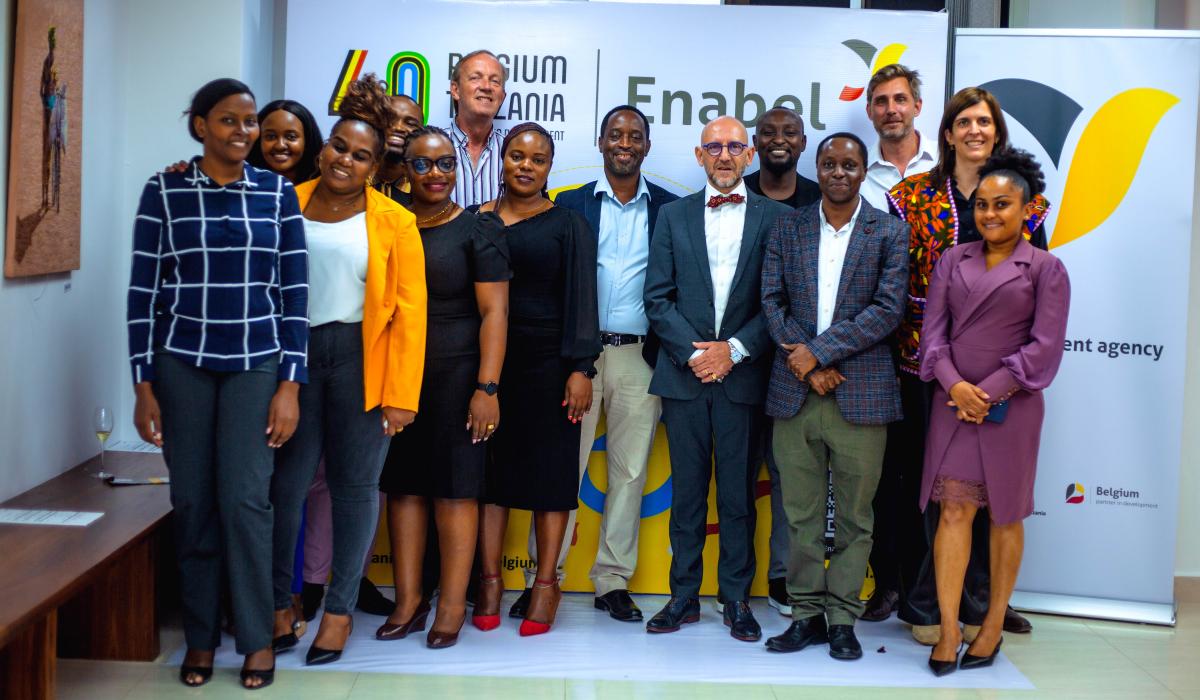
Enabel celebates 40 years of collaboration with Tanzania
Proscovia GREGORY | 23/05/2024
On May 16, 2024, Enabel's office in Dar es Salaam buzzed with excitement as we celebrated three monumental milestones: 40 years of bilateral cooperation between Tanzania and Belgium, 25 years of Enabel's impactful presence in Tanzania, and the inauguration of the new Representation office in Dar es Salaam. This event marked not only our enduring partnership but also underscored our shared commitment to driving sustainable development and improving livelihoods across the country.The event started with a warm welcome from Enabel’s Country Director, Koenraad Goekint, who highlighted the significance of the occasion and Belgium’s enduring partnership with Tanzania. Following this, His Excellency Peter Huyghebaert, Belgian Ambassador to Tanzania, reaffirmed Belgium's unwavering commitment to supporting Tanzania's development priorities, emphasizing that Belgium’s cooperation programs aim to address socio-economic inequalities, climate change, and urbanization. Belgium and Tanzania established diplomatic relations four decades ago, focusing on shared challenges and opportunities for mutual growth. Ambassador Huyghebaert recounted key areas of cooperation over the years, including transport, health, education, water and sanitation, agriculture, natural resource management, and public finance management. He particularly noted Belgium's significant role in revamping Tanzania's rail network in the 1980s and supporting the port sector from the onset of bilateral relations.For a quarter of a century, Enabel has been deeply involved in Tanzania, addressing critical issues and promoting sustainable development across the country. Our initiatives have spanned various sectors, including natural resources management, local governance, value chain development, and infrastructure enhancement. Our commitment to value chain development has played a pivotal role in driving economic growth and improving livelihoods in the country. Through targeted interventions, we have supported farmers and entrepreneurs to enhance productivity, access markets, and increase their incomes. During his address, Koenraad Goekint emphasized Enabel’s dedication to creating gender-balanced environments for youth and entrepreneurs through collaboration with stakeholders for vocational training and entrepreneurship opportunities. He highlighted the launch of a new five-year bilateral program aimed at empowering young people, particularly girls, in Kigoma through education and skills development. Furthermore, he touched on projects like the Water and Sanitation Kigoma Region Project (WASKIRP) and the Sustainable Agriculture Kigoma Regional Project (SAKIRP), which have significantly transformed communities by improving access to clean water and sanitation and strengthening agricultural value chains.Ambassador John Ulanga, Director of International Trade and Economic Diplomacy at the Ministry of Foreign Affairs and East African Cooperation expressed gratitude for Enabel's efforts to support the country towards sustainable and inclusive development. He emphasized the importance of maintaining bilateral ties to utilize opportunities in various areas, including investment and trade, to further promote development.As part of our achievements over the past decades, we showcased a new chapter in Enabel's journey—the opening of our vibrant and dynamic office space in Dar es Salaam where we collaborated with local artists to create a living exhibition within the walls of Enabel. This new space symbolizes our unwavering commitment to Tanzania and our determination to continue making a positive impact in the years to come. With our collaborative atmosphere, this space serves as a hub for innovation, creativity, and partnership.In closing, Koenraad Goekint extended a warm invitation to all attendees to explore our new space, engage in enriching discussions, and cultivate new connections that will drive our collective mission forward. "To my esteemed colleagues, I envision this office as a sanctuary of inspiration and empowerment, where ideas blossom and aspirations soar. Karibuni sana, Ahsanteni," he concluded.
-
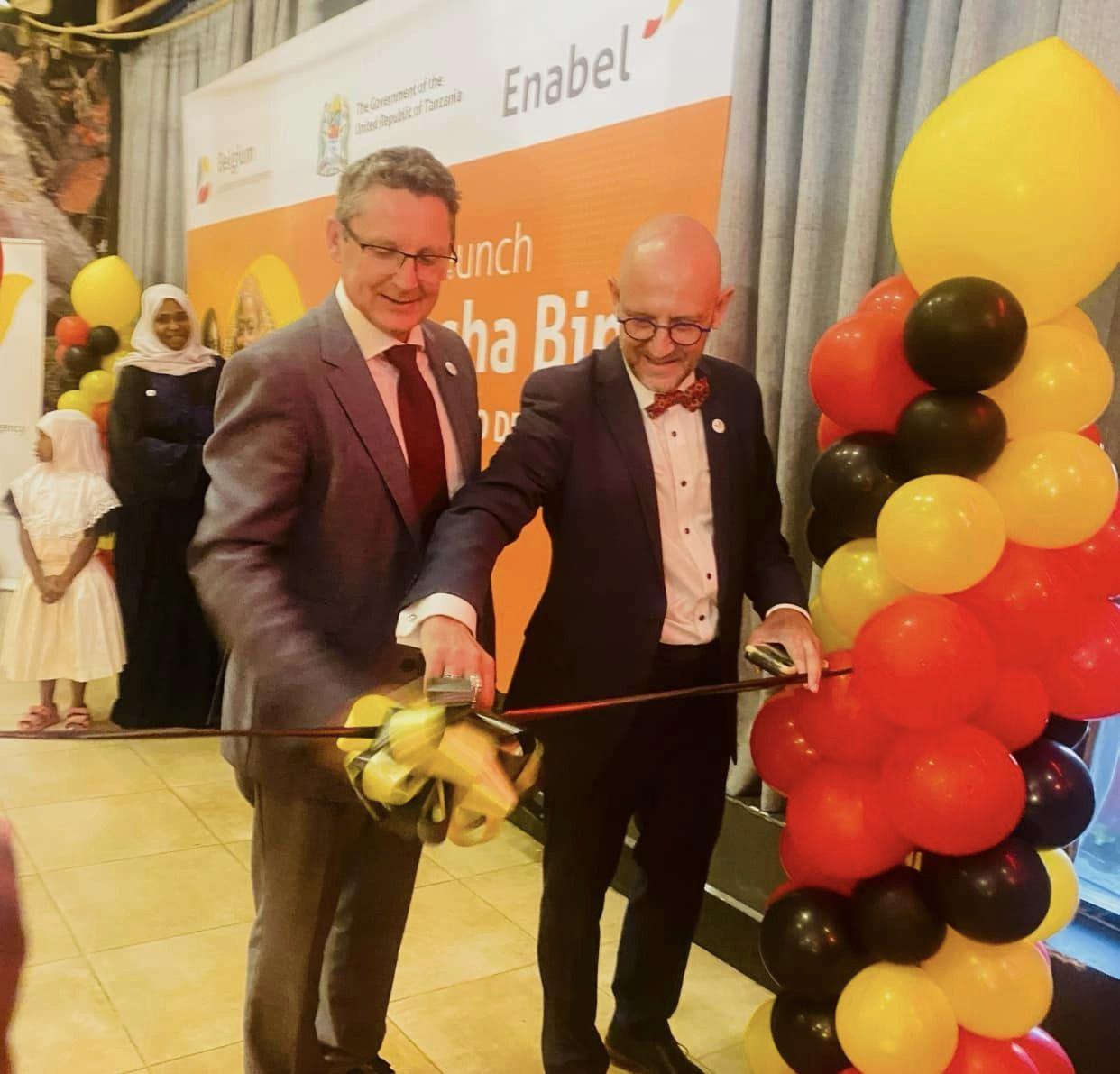
Wezesha Binti Program Launch: Empowering Youth, Fostering Equality, and Inspiring Change
Proscovia GREGORY | 14/12/2023
Enabel in Tanzania recently launched the Wezesha Binti (Empower the girl) program, a comprehensive effort designed to uplift girls and vulnerable boys in the Kigoma Region of Tanzania. This 25-million-euro Bilateral Cooperation between Belgium and Tanzania is dedicated to empowering young people, with a particular focus on young women. The program aims to foster a protective and gender-equal environment while equipping them with education and skills that create opportunities for decent work in the Kigoma Region. The initiative is specifically tailored for girls and vulnerable boys aged 14-19 in the districts of Kibondo, Kasulu, Buhigwe, Kigoma Rural, and Kigoma Urban. It ensures improved access to secondary education and training. The launch of the program emphasizes nurturing girls and young women in the Kigoma districts, encouraging their entry into various entrepreneurial sectors with flexibility and innovation as key pillars. Koenraad Goekint, Enabel's Resident Representative in Tanzania, outlined Enabel's vision during the launch, emphasizing the completion of secondary education and skills development for sustainable employment. Enabel in Tanzania is committed to fostering gender-balanced environments for youth and entrepreneurs, collaborating with relevant stakeholders to provide vocational training aligned with market needs, and promoting the growth of young entrepreneurs capable of generating employment opportunities. Ambassador Peter Huyghebaert highlighted the enduring collaboration between Belgium and Tanzania, emphasizing the program's objective of empowering young people. He connected this goal with addressing the significant challenge of gender-based violence in schools, recognizing it as a major obstacle to children's right to education. The Ambassador stressed that quality education not only empowers women but also contributes to improved health and livelihoods for both women and their children. The program encompasses targeted support, information dissemination, and awareness campaigns for re-entry, construction, rehabilitation, or upgrading of facilities. It involves capacity building for school staff on gender-related issues, support for a comprehensive Menstrual Hygiene Management (MHM) model, and the enhancement of secondary education quality through teacher in-service training, material provision, and life skills curriculum implementation. The project focuses on providing youth, especially young women, with labor market-relevant skills, aiming to enhance their (self)employment and entrepreneurship. This includes improving the quality and relevance of non-formal vocational education and training (VET), increasing access to quality VET for vulnerable groups, and fostering an environment in the Kigoma region that supports the needs of youth and women. Thobias Andengenye, Kigoma's Regional Commissioner, highlighted the significance of the program in improving the lives of youth, especially girls and young women aged 14 to 29 in the beneficiary districts. The initiative aligns with Enabel's commitment to collaborating with the government of Tanzania, local authorities, the private sector, civil society, and various stakeholders. The launch event was attended by government representatives, esteemed guests from international organizations, local NGOs, and implementing partners, adding a significant layer of collaboration and support to the initiative. The occasion was further enhanced by a special screening of the award-winning movie "Ndoto ya Samira," a compelling documentary portraying the journey of a 21-year-old woman as she navigates societal pressures on marriage while steadfastly pursuing her education. This cinematic addition brought a powerful and relatable dimension to the launch, shedding light on the challenges faced by young women in their pursuit of education amidst societal expectations.
-
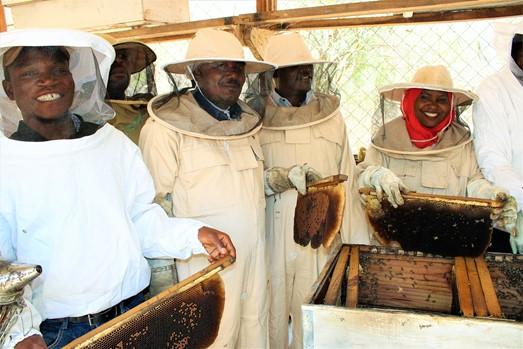
ENHANCING BEEKEEPING EXTENSION SERVICES
Deogratius KIMENA | 10/12/2023
Tanzania is the second largest honey producer in Africa and the largest African supplier to the EU, still most districts with high honey production levels lack specialized government extension officers. In September 2022, Enabel through EU funded Beekeeping Value Chain Support (BEVAC) Programme provided intensive training to 21 beekeeping extension officers from 7 regions (Tabora, Singida, Shinyanga, Kigoma, Katavi, North Pemba, and South Pemba) to equip them with appropriate knowledge, skills, and practices for them to support the sector better. The District Beekeeping Officer (Wildlife by professional) from Itigi District Council, John Makota, appreciated the session and said, “I did not know how modern bee hives are produced and the importance of maintaining bee-space measurements. This training helped me to gain knowledge, skills, and practice in the construction of top-bar hives and frame hives. I will use these skills to guide and educate my beekeepers and input suppliers on the importance of using modern hive technology”Moh’d K. Massoud District Forest Officer from Chake-Chake Pemba acknowledged receipt of new knowledge and skills of harvesting bee Venom. During the training he said, “I have been hearing about bee Venom from different stakeholders, now I know exactly what bee Venom is, its uses, and how to harvest it from bees. Now I have the competence to educate beekeepers in my district not only to rely on honey as the main bee product like how they currently do, rather they can explore the bee Venom market and increase their household income.”During honey processing practices, the District Beekeeping Officer from Mlele District in Katavi region Mr. Vicent Jackson Kizeze explained that “Recently, one exporter of honey from Mlele encountered a challenge whereby their export was found with 165 mg/kg amount of Hydroxymethylfurfural (HMF) which is above-recommended amount (80mg/kg) for Tropical honey. This highly affected the price of honey exported and as a consequence reduced income to this trader. Therefore, through this training, we need to learn more about the use of these processing machines and the amount of heat we can apply during the processing of honey to ensure quality is maintained.”
-
Supporting Establishment of New Bee reserves for Sustainable Beekeeping in Tanzania
Deogratius KIMENA | 27/11/2023
District Vice Councilor Mr. Stephen Petro Mtayana emphasizes the importance of environmental care in combating climate change and unlocking opportunities through bee reserves. In Choda village, part of the EU-funded BEVAC project, 19 villages, including Choda, are working to establish new Bee reserves. This initiative spans 8 villages in Kigoma, 3 in Katavi, 2 in Tabora, and 6 in Singida. Beekeeping in Tanzania, often in protected areas, will gain formal recognition through these reserves, ensuring sustainable production of honey and bee products. A significant 53,527 hectares of forest land will be conserved and legally acknowledged as a beekeeping reserve. #BeeReserves #SustainableFuture #BEVAChttps://princemediatz.blogspot.com/2023/11/bevac-moves-to-establish-new-conserved.html
-
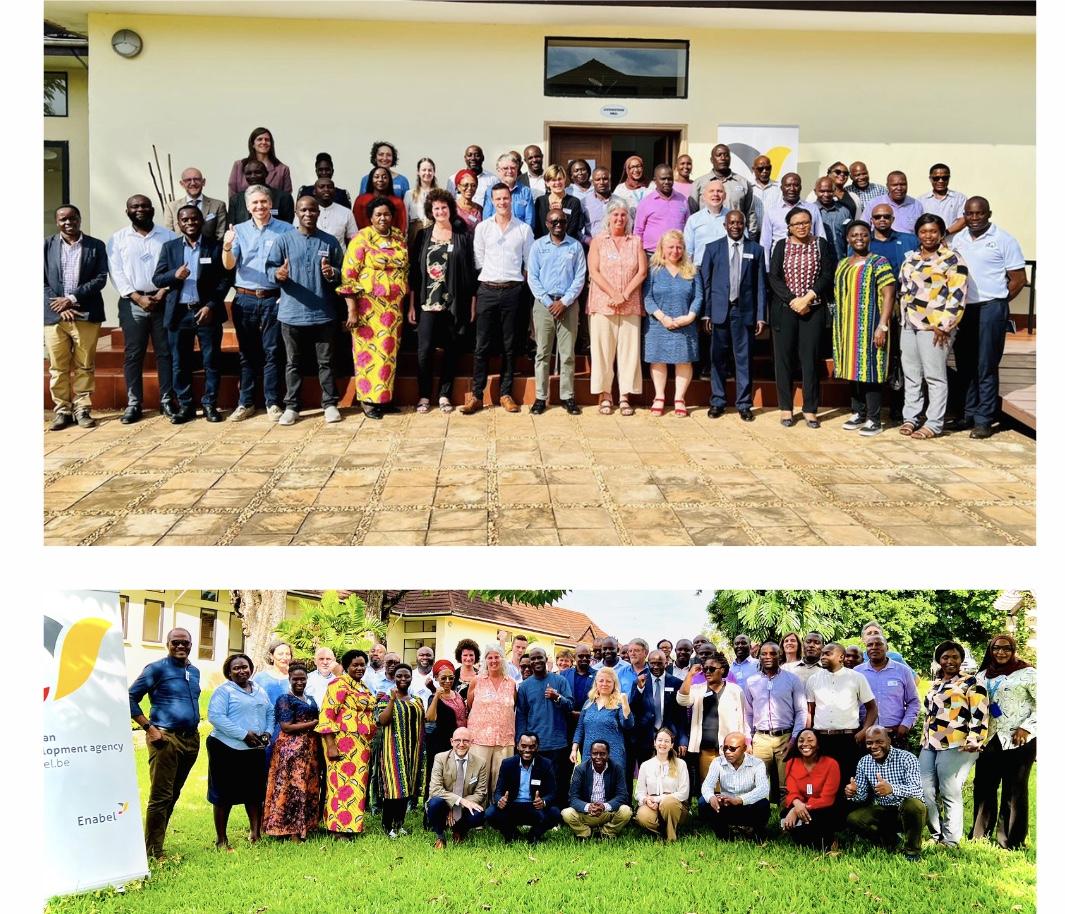
From school to decent work: A recap of the exciting Inception week for the 'Wezesha Binti' project
Proscovia GREGORY | 24/11/2023
Enabel in Tanzania alongside colleagues from Enabel Brussels conducted an inception meeting for the WEZESHA BINTI Project (2023-2028) in collaboration with various partners and stakeholders in the Kigoma region from November 20th to 25th, 2023. The meeting was meant to acquaint key partners and stakeholders about the Wezesha Binti Project, which focuses on empowering young people, especially young women and to ensure they are thriving in a protective and gender-equal environment by promoting their education and skills pathways and opportunities for decent work in the Kigoma Region. This project, centers on three key result domains: secondary education for vulnerable youth with a special emphasis on girls, skills development, employment, and entrepreneurship for decent work, and the establishment of a protective and gender-equal environment. Within these domains, the project encompasses targeted support provision, information dissemination, and awareness campaigns for re-entry, construction, rehabilitation, or upgrading of facilities. It also involves capacity building for school staff to offer quality counseling on gender-related issues, support for a comprehensive MHM (Menstrual Hygiene Management) model, and the improvement of secondary education quality in conducive learning environments through teacher in-service training, provision of materials, and support for life skills curriculum implementation. The project further focuses on providing youth, particularly young women, with labor market-relevant skills, contributing to their (self)employment and entrepreneurship. This includes increasing the quality and relevance of non-formal vocational education and training (VET), improving access to quality VET for vulnerable groups, and fostering an environment in Kigoma region that supports the needs of youth and women.A key aspect of the project involves creating a supportive environment for girls, where communities, families, and local governments work together to enable girls and young women to further their education and achieve economic empowerment. Throughout the meeting, project partners and the implementation unit actively contributed to the project strategy, gaining a comprehensive understanding of project interventions, the theory of change, and the monitoring, learning, and evaluation framework. The discussions focused on the expected results from interventions, and potential risks were identified, with brainstorming sessions to formulate measures and mitigation strategies. Enabel, during the meeting shared project details and engaged in collaborative discussions with partners to ensure that girls and young women in targeted areas in Kigoma receive the necessary support. The goal is to provide diverse learning opportunities, enabling them to access environmentally friendly jobs and enhance entrepreneurial prospects. Moreover, Enabel facilitated roundtable discussions between the Project implementing team and key partners. This interactive session served as a platform to deepen understanding of the WEZESHA BINTI Project's objectives. The Enabel team actively engaged with partners, exchanging insights and perspectives to ensure a comprehensive grasp of the project's goals and strategies.
-
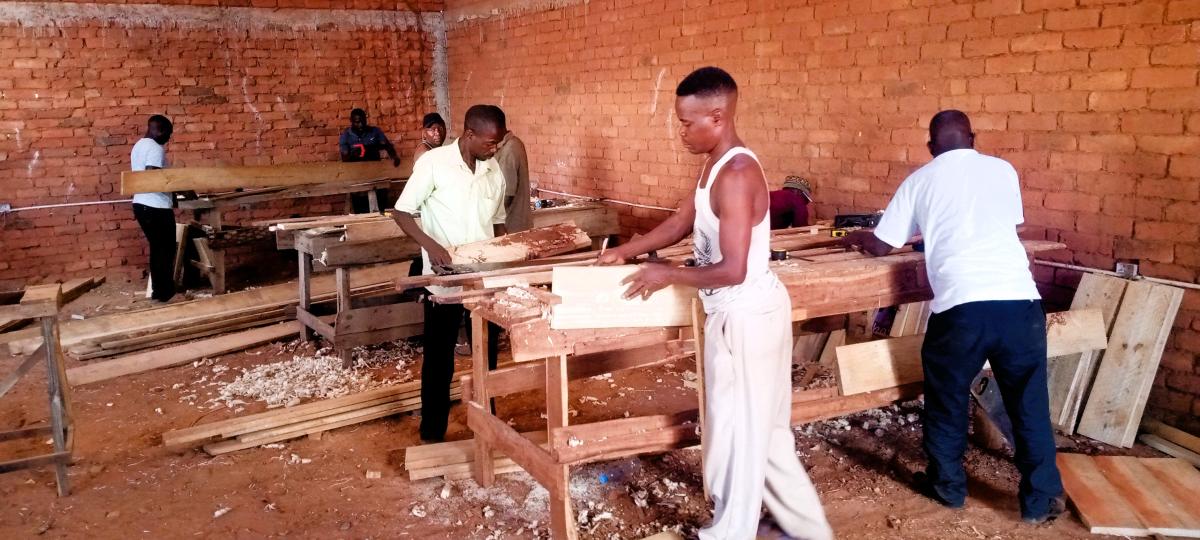
Access to affordable and improved bee hives to beekeepers in Katavi, Tanzania.
Deogratius KIMENA | 21/11/2023
Recognizing the success of 15 carpenters from Katavi who have completed a 6-day training in advanced bee hive construction. The training, organized by Enabel through the EU-funded BEVAC project, involved artisans from Mlele, Nsimbo, and Tanganyika, working towards enhancing sustainable beekeeping practices by ensuring access to improved bee hives. #SkillDevelopment #CommunityBuildinghttps://sematvmedia.blogspot.com/2023/11/bevac-trains-carpenters-in-katavi.html
-
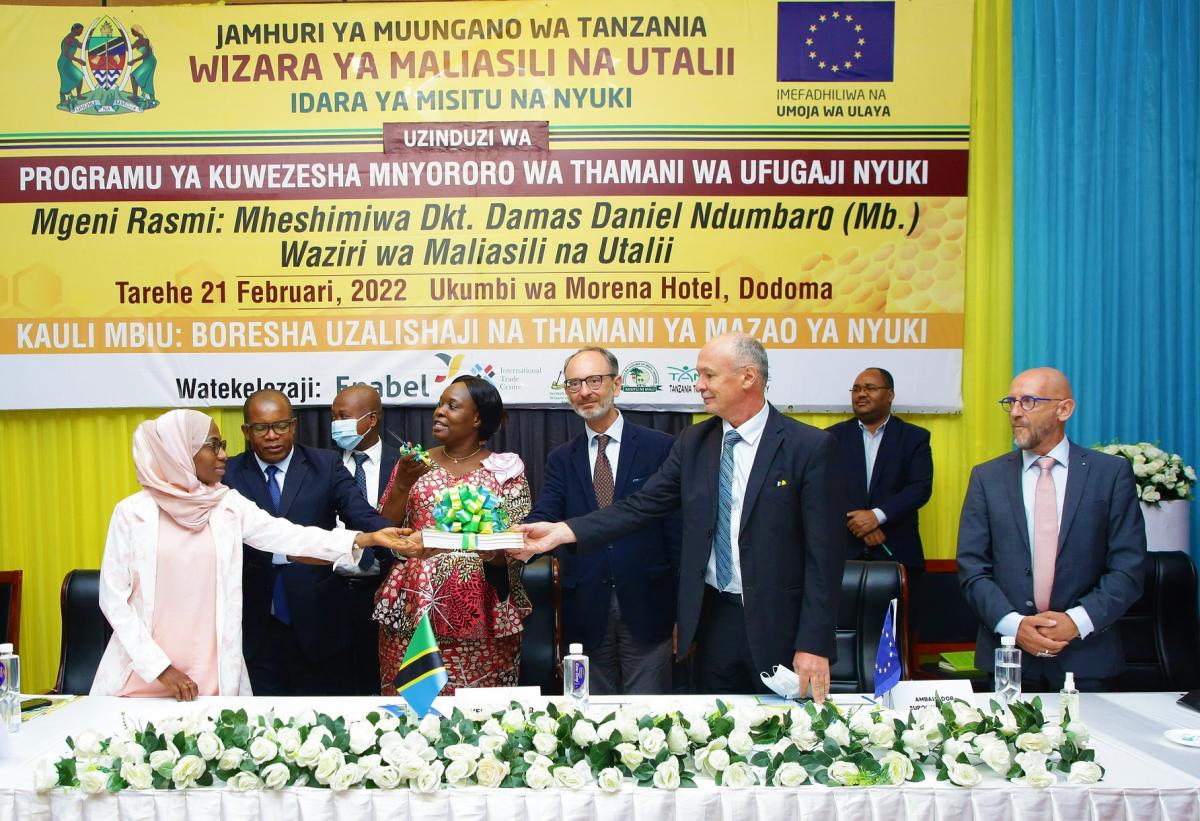
In Tanzania, the Beekeeping value chain project held its launch event!
Deogratius KIMENA | 28/03/2022
BEVAC project launching event took place on the 21st of February, 2022 at Morena Hotel in Dodoma.The Deputy Minister of Natural Resources and Tourism (MNRT), Hon. Mary Masanja, on behalf of Guest of Honour Hon. Dr. Damas D. Ndumbaro the Minister of Natural Resources and Tourism and the EU Ambassador Hon. Manfredo Fanti launched the Programme. Also present was the Belgium Ambassador Hon. Peter Van Acker, Minister of Tourism and Heritage, Hon. Leila Mohammed Mussa on behalf of Minister of Agriculture, Irrigation, Natural Resources and Livestock - Zanzibar, Hon. Dr. Soud Nahoda Hassan. The main objectives of the workshop were to officially launch a project that has been designed by the joint cooperation between the European Union and the Government of Tanzania and create public awareness about the project and ensure the buy-in of the key stakeholders as well as all project intervention areas and partners. The event brought together government leaders and representatives, development partners, private sector companies, non-governmental organizations (NGOs), beekeeper's cooperatives and associations, and other stakeholders in the beekeeping value chain from Tanzania Mainland and Zanzibar.https://www.instagram.com/p/CaQMP4stHcs/?utm_medium=share_sheet&img_index=4https://www.youtube.com/watch?v=jfArsTf8B8Ihttps://www.youtube.com/watch?v=0Vf1dyzPpAc
-

Construction of stone arch bridges to facilitate market access in Tanzania
Willem VAN DER VOORT | 20/08/2020
The Sustainable Agriculture Kigoma Region Project (SAKiRP) has a successful component “access to agricultural commodity markets”. The construction of stone arch bridges contributes to this component by facilitating the transportation of agricultural produce and thus reducing the cost of transportation for farmers.Stone arches are a strong and time-tested technology that fits with the local economic reality of expensive industrial materials as opposed to a low labour cost.Due to the elimination of all industrial materials except for cement and thanks to the support of the villages, a stone arch bridge can be built at a cost of only 15 to 20% of an equivalent concrete bridge.At the same time, a stone arch bridge emits 50 to 80% less carbon dioxide than an equivalent concrete bridge.The lower cost reduces the strain on the national infrastructure budget and reinforces the local governments’ autonomy, allowing them to upgrade 10 river crossings with an average district budget rather than 1 crossing in the case of concrete bridge technology. The Tanzanian Rural Roads Agency (TARURA) is an enthusiastic partner of SAKiRP and aims to incorporate the stone arch bridge technology in their organization for future implementation.On the other hand, the involvement of the villages ensures that bridges are only built where there is a real demand.Once the bridge is finished, the same villages will take more care of the bridge they helped building than in the case where an external contractor executed the construction.After a one-year start-up period, SAKIRP has completed 17 bridges and 18 more are under construction. The scale-up of the construction effort will see 70 bridges completed by the end of the project.
-
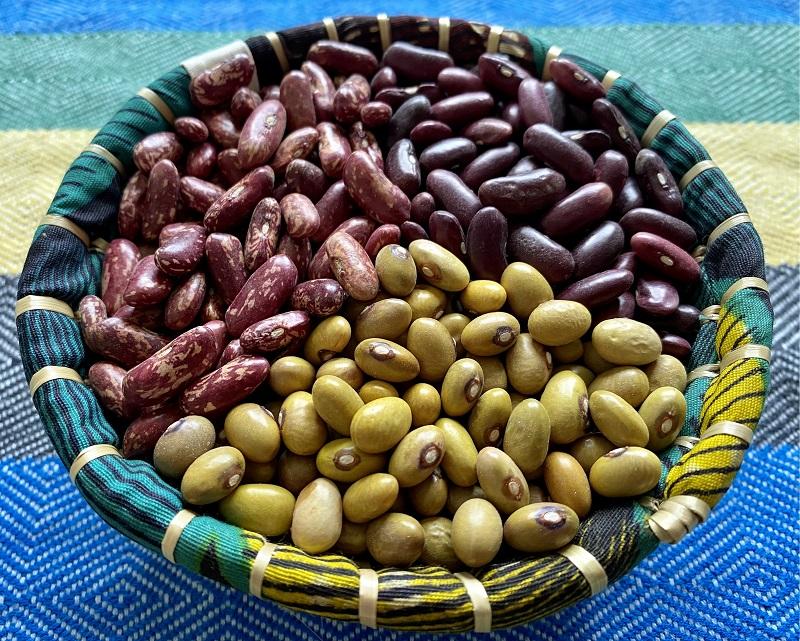
Enabel and the World Food Programme partner to connect Kigoma farmers to market in refugee food assistance - Tanzania
Cindy SPIEKART | 08/06/2020
World Food Programme and Enabel join achievement has been published in the paper edition of "The Guardian" in Tanzania. Here under, you'll find extracts of the article, the full article is available here: https://www.ippmedia.com/en/business/belgian-agency-enabel-team-wfp-offer-kigoma-farmers-marketKakonko, like neighbouring districts, has red soil that turns into a heavy dust during the dry season. When it rains, most of the residents are busy planting maize, cassava, beans, bananas as well as other staple crops. Many of the farmers are dependent of the annual harvest for the majority of their income for the entire year. “Every year we are in the fields working, but the lingering question always is, ‘Are we going to be able to find a buyer?’ and ‘How much will we get,’” says Jackson Christopher, a forty-year-old farmer, born and raised in Kakonko. Kakonko is in Kigoma region, bordering Burundi in the northwest of Tanzania. It is estimated that as a region, over 90,000 metric tonnes of beans – enough to fill 3,000 trucks - are produced in Kigoma each year. Of this, 24,000 metric tonnes are “surplus” and traded within Tanzania, supplying markets such as Dar es Salaam, and in neighbouring regions.For smallholder farmers like Jackson, accessing these markets can be a daunting challenge. Typically, farmers market their produce locally within the village or ward. A buyer might come and purchase the produce, but the prices can be unfavourable for the farmer who is left with little to no other option. For the buyer, receiving consistent quality can be a challenge and transporting the produce up the supply chain can be expensive. “That is why we use a value chain approach to organize smallholder farmers to produce high-quality produce and bring it to market,” said Earnest Musinamwana, Agricultural Marketing Advisor for Enabel – The Belgian Development Agency. Enabel, with funding from the Government of Belgium, works with 15,000 farmers throughout Kigoma region under the Sustainable Agriculture Kigoma Regional Project (SAKIRP). Using a pro-poor value chain development approach, farmers are systematically supported from production all the way through storage and marketing. Access to finance helps farmers purchase various agro inputs like improved and marketable seed varieties, pesticides and fertilizer while training and extension coaching on good agricultural practices helps farmers to maximize the quantity and quality of their harvests. “Our ultimate objective is to increase the income of smallholder farmers in Kigoma region,” said Earnest. “While we work to boost smallholder farmer productivity and reduce their post-harvest losses, the last piece is finding a reliable market for the produce.”"..."The United Nations World Food Programme (WFP) provides, refugees with rations of cereals, pulses (including beans), vegetable oil, specialized nutritious food and salt to meet their daily minimum food requirements. In total, WFP provides food assistance to 230,000 refugees in Tanzania and over one million vulnerable persons in neighbouring countries including Uganda, Democratic Republic of Congo, South Sudan Burundi and Rwanda. Last year, WFP purchased20,000 metric tonnes of food in Tanzania at a cost of nearlt USD 9 million. The food was then distributed in Tanzania and in neighbouring countries. “WFP is a big buyer of food commodities produced locally in Tanzania,” said Michael Dunford, WFP Representative in Tanzania. “In collaboration with Enabel, WFP is now able to help unlock a new market for smallholder farmers in the host community can benefit from WFP’s support to refugees. With the success of this procurement WFP will continue to expand support through more purchases directly from the local community.”With the assurance that WFP would buy their beans, farmers supported by Enabel mobilised themselves to produce a sufficient quantity of beans while meeting the required quality levels. Jackson harvested 18 bags, or about 1.3 metric tonnes of market-grade beans."..."“WFP and Enabel are key partners in this project, providing a catalyst for transforming smallholder farming from a largely subsistence operation into a commercial one,” said Peter Van Acker, Ambassador of Belgium to Tanzania, “and purchasing food directly from smallholder farmers in Kigoma is a great opportunity to support the refugee hosting communities. In my previous capacity as Director of Humanitarian Affairs at the Belgian Ministry of Foreign Affairs and Development Cooperation, I had been struggling with the concept of the nexus between humanitarian and development aid. To see this happening now in Tanzania makes me extremely proud."“For too long, humanitarian and development actors have been working independently one from another. Enabel believes that strengthening the coherence and coordination between humanitarian and development efforts and building on their respective comparative advantages strongly contributes to reduce needs, risks and vulnerability of populations. Supporting the humanitarian-development architecture through local development actions reduces the vulnerability of displaced women and men while it enhances the resilience of communities and systems in hosting countries” said Patrick Gaudissart, Resident Representative of Enabel in Tanzania.About 150 kilometres to the southwest of Kakonko is Tanzania’s largest refugee camp, Nyarugusu. The camp is home to 136,000 refugees, of which 76,000 are from Democratic Republic of Congo and the remaining are primarily from Burundi. Ms. Abilola Tabu Angelique, a refugee from the Democratic Republic of the Congo serves as the President for refugees in Nyarugusu Camp. She has been in Tanzania for 22 years, first at Lugufu refugee camp before being moved to Nyarugusu ten years ago. “We are continually grateful to the Government of Tanzania and to our neighbouring residents for being generous hosts,” said Abilola. “It makes us happy to know that our closest hosts are doing well and able to access the WFP market.--------------------------------------------------------------------------------------------------------------------*The United Nations World Food Programme is the world’s largest humanitarian organization, saving lives in emergencies, building prosperity and supporting a sustainable future for people recovering from conflict, disasters and the impact of climate change. Top donors to WFP Tanzania’s refugee operation include USA, United Kingdom, European Union, Ireland, Canada and Germany. **Enabel is the Belgian development agency. It implements and coordinates Belgium’s international development policy and primarily works for the Belgian State. The agency also implements actions for other national and international donors. Enabel manages about 150 projects, mostly in fragile states in Africa. Enabel has 1,500 staff, of which more than 70% is local personnel. In Tanzania, Enabel is currently active in three sectors: Natural Resources Management/Water/Agriculture in Kigoma region and food security in Arusha Region.
-

Cassava value chain in Kigoma Region.
Deogratius KIMENA | 09/12/2019
Cassava is the food crop grown in Kigoma region by most farmers. Due to low cost of production most farmers prefer to produce cassava as a food security strategy and business as well especially for export to Burundi, Uganda and Rwanda. This video depicts interventions made by SAKiRP in different dimensions of cassava value chain in Kigoma
